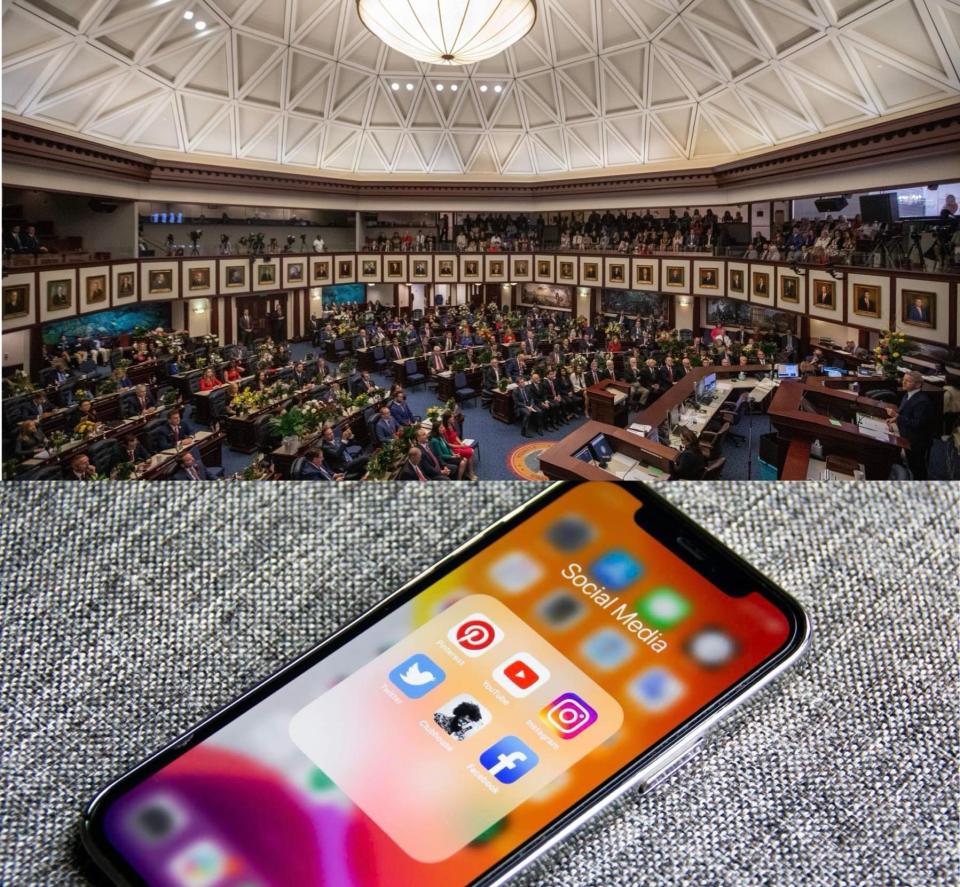DeSantis lauds 'free state' of Florida. He should let parents decide kids' social media use.
- Oops!Something went wrong.Please try again later.
A few years ago, I was at the airport with my then 10-year-old niece. Her excitement about traveling was palpable, and she eagerly took in everything around her.
Something she observed struck her as strange. “Everyone is hypnotized by their phones!” she exclaimed.
It was true. People throughout the airport seemed glued to their screens, oblivious to the real world around them.
That’s our reality now. Phones and apps are our most constant companions, and the age that attachment happens is getting younger and younger.
It’s not a good trend, especially for children, who are learning about the world and how to form relationships. Kids are now lonelier, unhappier and more depressed than ever, and screen time is certainly a culprit.
In his latest book, social psychologist Jonathan Haidt says smartphones and social media have rewired kids’ brains – and not for the better.
“There is a huge opportunity cost to children and adolescents when they start spending six, or eight, or perhaps even 16 hours each day interacting with their devices,” he writes.
The problem is clear – the solution less so.

Does DeSantis really think parents know best?
Florida last week inserted itself into this discussion with a law that limits children’s ability to use social media.
More on that soon, but a quick segue first: Gov. Ron DeSantis has been busy. When he left the Republican presidential primary earlier this year, DeSantis did not go home to Florida and pout.
He’s been getting things done. He recently signed a bill that prevents squatters from taking over a landlord’s property and a bill that prohibits homeless encampments on public spaces – two issues that have plagued blue states like New York and California.
And last week, DeSantis and state officials settled their ongoing legal battles with Disney – a huge win for DeSantis. Pretty much everyone on the left and in the media had called him a fool and predicted he’d lose to Mickey Mouse’s "brass knuckles."
There’s a lot DeSantis gets right when it comes to making Florida an enviable place to live. He often touts Florida as the “free state” and how parents should be the ones to make decisions about their children’s upbringing.
TikTok ban is bad idea: Biden has shown us why government and social media shouldn't mix
That’s why I was surprised that he signed this law that prohibits children under the age of 14 from joining social media accounts. Those who are 14 and 15 will need a parent’s consent. The law also includes additional requirements to keep minors from accessing pornography sites.
“Social media harms children in a variety of ways,” DeSantis said in a statement. “HB 3 gives parents a greater ability to protect their children.”
Sure, social media is awful in a lot of ways (for adults, too), but should the government – and thanks to this law, social media companies – be the hall monitor?
That’s a job that seems to fall squarely on the shoulders of parents.
If Florida doesn’t scrap law, courts will
The fact California is one of the handful of states that have tried similar social media interference should have given DeSantis pause.
After all, California Gov. Gavin Newsom is DeSantis’ arch nemesis.
The Florida model: In red vs. blue state debate, DeSantis offers best case for successful governing
In California, Arkansas and other states, these measures have quickly gotten struck down in the courts on First Amendment grounds. They simply go too far to limit the expression of young people.
And then there are the privacy concerns that could affect all social media users. To avoid hefty fines for violating the law, companies would need to implement more invasive techniques to access their sites.
Opinion alerts: Get columns from your favorite columnists + expert analysis on top issues, delivered straight to your device through the USA TODAY app. Don't have the app? Download it for free from your app store.
To his credit, DeSantis did earlier veto another version of this legislation – one that was even broader in scope. That bill faced increased likelihood of a legal challenge.
The truth is the new law will still end up in court, and Florida isn’t likely to win.
I’m all for governors like DeSantis who say they stand for freedom and parents’ rights. But they need to be consistent.
Ingrid Jacques is a columnist at USA TODAY. Contact her at ijacques@usatoday.com or on X, formerly Twitter: @Ingrid_Jacques.
You can read diverse opinions from our Board of Contributors and other writers on the Opinion front page, on Twitter @usatodayopinion and in our daily Opinion newsletter.
This article originally appeared on USA TODAY: DeSantis signs social media law, making Florida more of a nanny state

